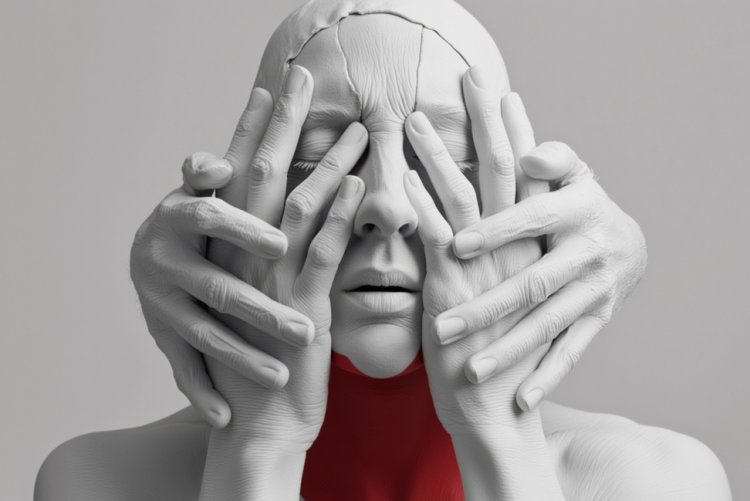Emotional Rollercoaster: Life with Borderline Personality Disorder
Borderline Personality Disorder (BPD) stands as a multifaceted mental health condition, marked by pervasive instability across emotional regulation, interpersonal relationships, self-perception, and behavior patterns. Individuals grappling with BPD often navigate through intense emotional upheavals, struggling to maintain stability in various facets of their lives, which significantly impairs their overall functioning and quality of life.

Symptoms
- Intense and Unstable Relationships: People with BPD often find themselves in tumultuous relationships, swinging between idealizing and devaluing others. This emotional rollercoaster creates chaotic and stormy interpersonal dynamics.
- Identity Disturbance: A core feature of BPD is a fragmented or unstable sense of self. Individuals may struggle with chronic feelings of emptiness and identity confusion.
- Emotional Dysregulation: BPD is synonymous with intense and rapidly shifting emotions, ranging from deep despair to euphoria, often triggered by seemingly minor events. The inability to regulate these emotions causes significant distress and impairment.
- Impulsive Behavior: Impulsivity manifests in various ways, including reckless spending, substance abuse, binge eating, risky sexual encounters, and self-harm behaviors like cutting or suicidal gestures.
- Fear of Abandonment: An overwhelming dread of abandonment plagues people with BPD, driving them to extreme lengths to avoid real or perceived rejection. This fear can lead to desperate attempts to maintain relationships, even at the cost of personal well-being.
- Chronic Feelings of Emptiness: Despite external achievements, individuals with BPD often grapple with a persistent inner void or emptiness, contributing to their profound emotional distress.
- Dissociative Symptoms: Some people with BPD may experience episodes of dissociation, feeling disconnected from themselves or reality, with a distorted perception of their surroundings or identity.
Causes
The exact cause of BPD remains unknown, but research suggests a combination of factors may be involved:
- Genetic Vulnerability: Studies indicate a genetic predisposition to BPD, with a higher prevalence among first-degree relatives of individuals with the disorder.
- Neurobiological Factors: Brain scans show abnormalities in areas related to emotional regulation, impulse control, and interpersonal processing, suggesting a neurobiological basis for BPD.
- Early Life Adversity: Childhood trauma, including neglect, emotional abuse, or disrupted attachment patterns, significantly increases the risk of developing BPD later in life. Adverse childhood experiences contribute to maladaptive coping mechanisms and interpersonal difficulties characteristic of BPD.
- Invalidating Environment: Growing up in an environment where one's emotions are routinely dismissed, invalidated, or met with hostility can exacerbate BPD symptoms. A lack of emotional validation undermines the ability to regulate emotions effectively.
Effects
BPD can have a significant negative impact on various aspects of life:
- Interpersonal Dysfunction: The erratic and intense relationships characteristic of BPD often lead to chronic conflict, instability, and frequent relationship breakdowns, resulting in social isolation and loneliness.
- Occupational Impairment: Impulsivity, mood swings, and interpersonal difficulties can make it challenging to maintain steady employment. Individuals with BPD may struggle to follow workplace norms, leading to job loss or frequent job changes.
- Emotional Turmoil: BPD inflicts profound emotional distress, with individuals experiencing relentless mood swings, persistent feelings of emptiness, and a pervasive sense of inner turmoil, which may culminate in self-destructive behaviors or suicidal ideation.
- Physical Health Complications: Engaging in impulsive and risky behaviors, such as substance abuse or self-injury, increases the risk of physical health complications, ranging from substance-related disorders to injuries or infections.
Diagnosis and Treatment
A qualified mental health professional can diagnose BPD through a comprehensive assessment, including a review of symptoms, personal and family history, and possibly psychological testing to rule out other conditions. Treatment for BPD typically involves a combination of approaches:
- Psychotherapeutic Interventions: Dialectical Behavior Therapy (DBT) is considered the gold standard for BPD treatment. It focuses on developing skills in emotion regulation, distress tolerance, interpersonal effectiveness, and mindfulness. Other therapies like Cognitive-Behavioral Therapy (CBT) and Schema Therapy can also be beneficial.
- Medication Management: While no specific medication is FDA-approved for BPD, medications may be prescribed to target comorbid conditions or specific symptoms, such as antidepressants for mood stabilization or antipsychotics for managing impulsivity and aggression.
- Comprehensive Treatment Approach: A multidisciplinary approach integrating psychotherapy, medication management, and psychosocial interventions holds promise for effectively addressing the complex needs of individuals with BPD, promoting recovery, and enhancing overall functioning and well-being.
Living with BPD can be challenging, but with comprehensive and individualized treatment, individuals with BPD can embark on a path towards healing, resilience, and an improved quality of life. Early intervention and ongoing support are crucial for positive outcomes and recovery.
Disclaimer:
The information provided in this article is for educational purposes only and should not be considered medical advice. If you have any health concerns or are experiencing symptoms, it is important to consult with a healthcare professional for proper diagnosis and treatment.
#BorderlinePersonalityDisorder #MentalHealth #BPD #EmotionalRegulation #Relationships #SelfImage #DBT #Therapy #Recovery
What's Your Reaction?





















